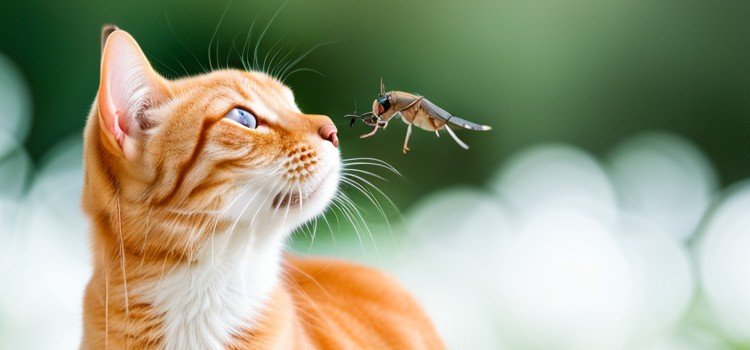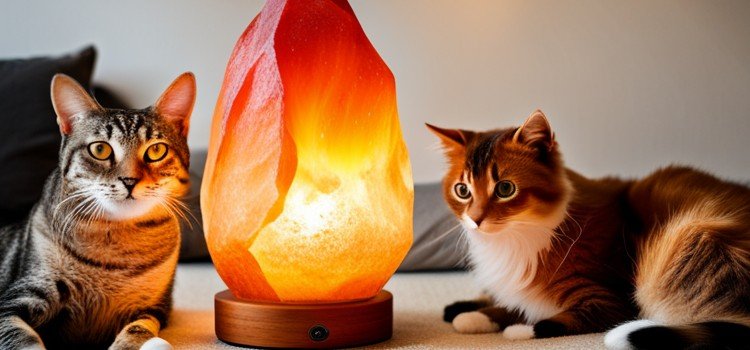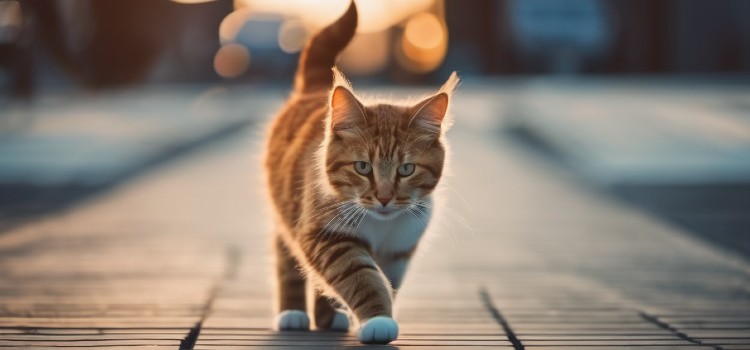As an Amazon Associate committed to the mission of improving the lives of our readers, Live-Clear.com receives a small commission from eligible purchases made through our affiliate links. This revenue enables us to keep producing insightful articles and other material.
Cats cry when their owners take a shower because they feel abandoned. This is because cats can’t tolerate water and perceive a bathroom as a vulnerable place.
Taking a shower can be a peaceful and refreshing experience until your furry friend starts crying outside the bathroom door or scratching at the door. This might be inconvenient and annoying for you, but have you ever wondered why your cat does this?
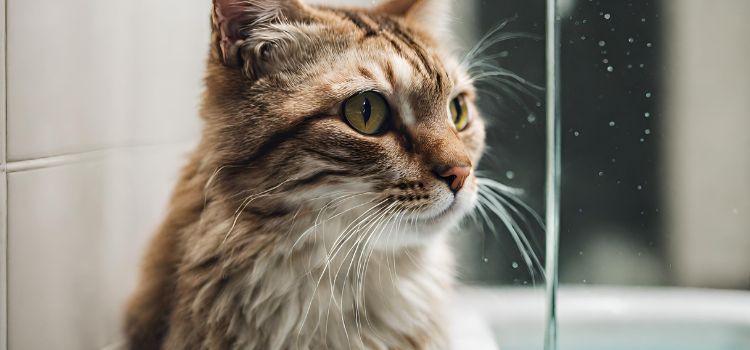
Cats are known to perceive the bathroom as a vulnerable place, and they may feel abandoned when you take a shower. Additionally, cats don’t like water and may feel uncomfortable with the sound that comes from your shower. We will explore why some cats cry when their owners shower and how you can help them feel more secure during this time.
Reasons Your Cat May Cry In The Shower
Cats are known for their peculiar behavior, and crying when you take a shower is one of them. There are various reasons why your furry friend may cry when you are in the shower, and we have outlined some of them below:
The Sound Of Water
The sound or sight of water can trigger anxiety in some cats and may cause them to cry. They may not understand what is happening, and the sound of water can be frightening for them. It is important to acclimate your cat to water gradually, so they do not become anxious or fearful around water.
Curiosity About Water
Cats are curious creatures by nature, and they may cry when they see or hear water because they want to investigate it. Some cats are drawn to water and enjoy playing with it. If your cat is crying in the shower, it may be because they are trying to figure out what is going on, or they want to play with the water.
Seeking Attention And Affection
Cats are affectionate creatures and crave attention from their owners. If your cat cries when you are in the shower, they may be seeking attention or affection. They may want to be near you and show you that they care, even if you are not available to play with them at the moment.
Elevated Stress Levels
Crying in the shower may be a sign that your cat is experiencing elevated stress levels. Cats can become stressed for various reasons, such as changes in their routine or environment, health issues or feeling unwell, and other factors. If you notice that your cat’s crying is excessive or out of the ordinary, it is crucial to seek advice from a veterinarian as soon as possible.
Your cat may cry in the shower for a variety of reasons, but there is no need to worry. By ensuring your cat’s wellbeing, taking time to acclimate them to water slowly, and providing them with ample attention and affection, you can help mitigate their anxiety and stress levels and prevent future crying behavior.
Understanding Your Cat’s Emotions
Cats can cry when their owners are in the shower due to separation anxiety. The sound of running water can heighten their distress, making them vocalize loudly. Understanding your cat’s emotions can help you reduce their anxiety and keep them calm.
As pet owners, we often wonder what our furry friends are trying to communicate with us. Cats have a wide range of emotions, and their behavior can sometimes be confusing. Have you ever noticed your cat crying outside the shower door while you’re taking a bath? This behavior is not uncommon among cats, and it speaks volumes about their emotions. Let’s explore some reasons why your cat may cry when you’re in the shower and how you can address their emotional needs.
Deciphering Feline Body Language
Cats are highly communicative animals and use their body language to express themselves. Paying attention to your cat’s body language is crucial in understanding their emotions. When your cat cries outside the shower, it means they are trying to communicate something to you. Do they want you to come out of the shower, or are they simply letting you know they are there? Take a closer look at their body language and see if there are any other indications of discomfort or anxiety.
Recognizing Signs Of Stress
Cats can become stressed due to various reasons, including changes in their routine, environment, or diet. If your cat is crying outside the shower, it could be a sign of stress. Other signs of stress in cats include excessive grooming, loss of appetite, aggression, and hiding. Stress can also lead to health problems, such as urinary tract infections or digestive issues. It’s essential to address your cat’s stress and help them feel calm and comfortable.
Addressing Your Cat’s Emotional Needs
As a pet owner, it’s crucial to ensure your cat’s emotional needs are met. In the case of your cat crying outside the shower, you can address their emotional needs by spending more time with them. Engage in interactive play sessions, cuddle with them, or simply sit beside them. Create a routine that your cat can rely on and feel secure in. Additionally, ensure your cat has access to their basic needs, such as food, water, and a clean litter box.
Cats cry outside the shower for various reasons, and it’s essential to understand their emotions and address their needs correctly. By deciphering their body language, recognizing signs of stress, and addressing their emotional needs, you can ensure your cat feels safe, comfortable, and happy. Always remember to show your furry friend the love and attention they deserve.
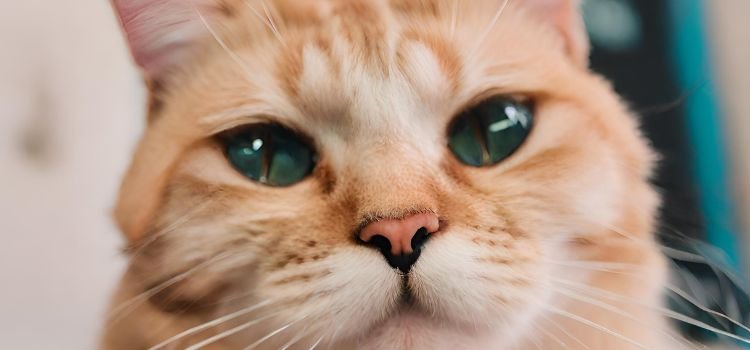
The Role Of Environment In Your Cat’s Behavior
Understanding your cat’s behavior is key to improving their quality of life. If your cat cries when you’re in the shower, it may be due to environmental stressors such as loud noises or limited access to water. Creating a calm and comfortable environment for your cat can help alleviate these behaviors.
Creating A Stress-free Environment
Cats are highly sensitive animals, and their behavior can often reflect their environment. When you shower, water is spraying, you’re often making loud noises, and it can cause your cat to become anxious, stressed, or even frightened. Stress and anxiety can cause your cat to cry, vocalize, or even urinate in inappropriate places. Creating a comfortable, stress-free environment for your cat is essential to ensure they feel safe and calm in your absence. To create a stress-free environment, you should provide a cozy and comfortable bed for your cat.
Make sure their litter boxes are cleaned regularly and are easily accessible. Cats require a secure and stable environment, so make sure their food and water bowls are placed in a peaceful and quiet spot. Furthermore, you can also play some soothing music or keep a TV on when you’re not at home.
Providing Mental And Physical Stimulation
Cats are curious animals and require mental and physical stimulation. Stimulating activities help to keep your cat’s mind sharp, and it keeps them engaged and active. Providing toys and scratching posts help to reduce stress levels and prevent destructive behavior. You can place a birdfeeder outside to provide your cat with some visual stimulation. Cats love to play hide-and-seek, so you can hide treats throughout the house to keep your cat engaged. You can also get your cat to solve puzzles and use interactive toys and games. If your cat has access to the outdoors, then outdoor activities such as climbing trees, hunting, and exploring keep them physically active.
Cats cry when in the shower because they are stressed and anxious. Creating a stress-free environment and providing mental and physical stimulation can help keep your cat calm and relaxed. By providing a comfortable environment with a regular routine, you can help your cat to feel safe and happy.
Training Your Cat To Overcome Shower Anxiety
Cats may cry when their owners shower due to anxiety. However, you can train them to feel more comfortable by gradually introducing them to the sound and smell of running water. Make sure to use positive reinforcement and take things slowly.
Training Your Cat to Overcome Shower Anxiety
Cats are known to have an innate sense of curiosity and an aversion to water. However, some cats are so attached to their owners that they will not let them out of their sight, even when they’re taking a shower. This behavior can be frustrating for the owners, but there are ways to train your cat to overcome its shower anxiety and be more independent. In this blog post, we will discuss two effective methods to help your cat feel more comfortable when you’re in the shower.
Positive Reinforcement Techniques
Positive reinforcement techniques are a great way to train your cat to feel more comfortable in the shower. This method involves rewarding your cat for good behavior with treats, toys, or praise. To implement this technique, you can follow these simple steps:
- Start by placing treats or toys near the shower area. This will help your cat associate the shower area with positive experiences.
- Reward your cat with treats or toys when they approach the shower area without crying or showing anxiety. This will help your cat to feel more comfortable and familiar with the shower area.
- Gradually increase the time your cat spends near the shower area and reward them for good behavior.
- Eventually, your cat will associate the shower area with positive experiences, and they will no longer cry or show anxiety when you’re in the shower.
Gradual Desensitization
Another effective method to help your cat overcome its shower anxiety is gradual desensitization. This method involves exposing your cat to the shower area in small steps and gradually increasing the level of exposure until the cat becomes desensitized to the shower. To implement this technique, you can follow these simple steps:
- Start by placing your cat in the bathroom while the shower is off. Allow your cat to explore the area freely.
- Gradually introduce water sounds by turning on the faucet. Initially, keep the water volume low to prevent anxiety.
- When your cat becomes comfortable with the sound of running water, it’s time to introduce them to the shower. Turn on the shower, but don’t get in yet.
- Finally, get in the shower and allow your cat to observe you. Continue to gradually increase the level of exposure until your cat is comfortable and no longer cries or shows anxiety.
Training your cat to overcome shower anxiety takes time and patience, but the results can be very rewarding. Positive reinforcement techniques and gradual desensitization are two effective methods to help your cat feel more comfortable when you’re in the shower. Remember to be patient and never force your cat into a shower if it’s not ready. With time and patience, your cat will overcome its fear of the shower and become a more independent and confident feline.

Natural Remedies For Anxious Cats
Cats may cry when their owners are in the shower due to anxiety. Natural remedies, such as calming pheromone sprays or diffusers, can help to soothe an anxious cat and reduce their stress levels.
Natural Remedies for Anxious Cats If your cat gets anxious, it’s distressing not just for the cat, but for the owner too. Cats display anxiety in a variety of ways, including crying, scratching, and hiding. In this post, we will explore some of the natural remedies that can help calm your furry friend down when they’re feeling anxious. Below are some of the most effective natural remedies for anxious cats.
Aromatherapy
Aromatherapy is known to soothe cats, just as it does for humans. Essential oils with calming properties can help reduce anxiety in cats. A few examples of such essential oils include lavender, chamomile, and valerian. You can add drops of essential oils to a diffuser or mix them with water to make a spray. Alternatively, you can use pre-made calming products like sprays or diffusers that come with essential oils specifically designed for calming anxious cats.
Calming Pheromones
Calming pheromones can help calm cats down effectively and naturally. Pheromones are naturally secreted by cats and are used to communicate with other cats. Calming pheromones from companies such as Feliway mimic the natural pheromones that cats produce. These pheromones come in sprays, diffusers, and collars, and are an excellent option to prevent anxiety in cats. Research has shown that calming pheromones can be effective at keeping cats calm.
Herbal Remedies
Herbal remedies are another effective way to soothe anxious cats. Just like in humans, certain herbs can have a calming effect cat’s anxiety. Examples of herbs that can have a calming effect include passionflower, lemon balm, and catnip. These herbs can be used in a variety of forms, such as tinctures or tea. If your cat is prone to getting anxious, consider using these herbs as a natural remedy.
These natural remedies can help reduce your cat’s anxious feelings while also providing them with a comfortable and relaxed environment. By using these alternatives, pet owners can help alleviate their cats’ discomfort safely without the need for pharmaceuticals. Experiment with the different natural remedies mentioned above to find the best solution that works for your furry friend.
When To Consult A Veterinarian
Many cat owners have experienced the strange behavior of their feline friends crying while they’re in the shower. The reason why cats do this may vary. Some experts believe that cats are simply seeking attention, while others think it has to do with the sound of running water.
Physical Health Concerns
In some cases, crying while you’re in the shower can be a sign of physical health concerns. For example, cats that are experiencing pain or suffering from a urinary tract infection may cry excessively while their owners are in the shower. Additionally, if you notice that your cat cries while you’re in the shower and also experiences other symptoms such as vomiting, lethargy, or lack of appetite, you should consider taking them to the veterinarian.
Psychological Disorders
While crying when you’re in the shower can sometimes be a sign of physical health concerns, it can also indicate the presence of psychological disorders in some cats. For example, cats that have separation anxiety may cry when their owners are showering because they feel anxious and alone. Similarly, cats that have experienced trauma, such as abuse or neglect, may also be prone to crying when their owners are in the shower.
If you notice that your cat is crying when you’re in the shower and they have other symptoms such as vomiting, lethargy, or lack of appetite, it’s important to take them to the veterinarian. This could be a sign of a more serious underlying health condition such as a urinary tract infection or other physical ailments that require medical attention.
Additionally, if your cat’s crying seems excessive or is accompanied by other behavioral changes, such as hiding or aggression, consulting a veterinarian is crucial. They can help identify whether your cat is experiencing psychological distress or whether there is an underlying health issue that needs to be addressed.
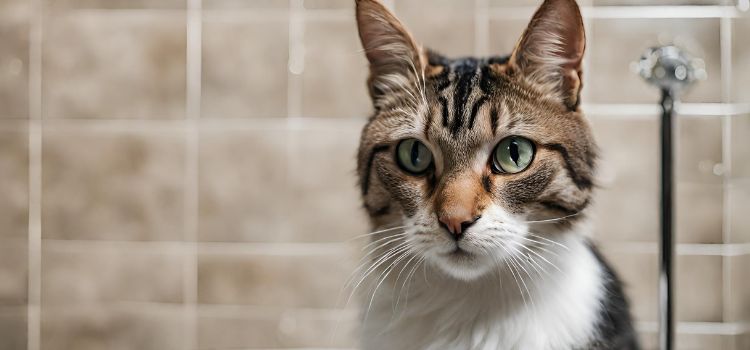
Conclusion
If you’ve ever wondered why your cat cries when you’re in the shower, it could be a few different reasons. It’s possible that your feline friend is anxious or worried about you, or they may simply want attention. By understanding their behavior and providing them with the comfort and reassurance they need, you can help your cat feel more secure and relaxed in your home.
Frequently Asked Questions For Why Does My Cat Cry When I’m In The Shower
Cats may cry when their owners shower because they want attention or feel anxious being alone. They may also dislike the sound of the shower or the scent of shampoo. It’s best to provide them with toys and treats or let them into the bathroom to alleviate this behavior.
Cats may freak out when you take a shower due to the sound of running water, humidity, and changes in routine. They may also feel trapped or vulnerable without an escape route. It’s a common behavior among cats but can be managed by providing a calm environment or distraction.
Your cat may think you are in danger when you take a shower due to the sound of running water. However, some cats may enjoy watching the water flow and see it as a form of entertainment. Ultimately, it depends on your cat’s personality and preferences.
Your cat could be smelling the shampoo or soap on you, or they may be reacting to the sound and movement of water. Some cats are also fascinated with the steam or moisture in the bathroom. It’s a natural behavior for cats to be curious and playful, especially with anything new or different in their environment.
Cats cry when owners take showers because they feel separated and alone. The sound of running water can also be stressful for cats.
Remember to always be patient and compassionate, and to give your cat the love and attention they deserve.
Amazon and the Amazon logo are trademarks of Amazon.com, Inc, or its affiliates.
